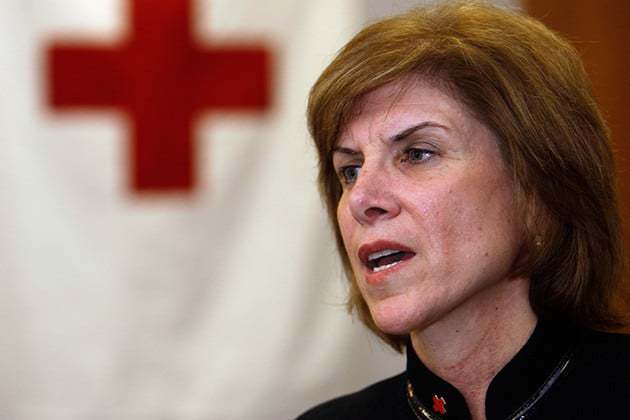
This story was co-produced with NPR.
American Red Cross CEO Gail McGovern has long portrayed her organization as a beacon of openness, once declaring “we made a commitment that we want to lead the effort in transparency.”
But when the Government Accountability Office, the investigative arm of Congress, opened an inquiry last year into the Red Cross’ disaster work, McGovern tried to get it killed behind the scenes.
“I would like to respectfully request that you consider us meeting face-to-face rather than requesting information via letter and end the GAO inquiry that is currently underway,” McGovern wrote in a June 2014 letter to Rep. Bennie Thompson, D-Miss.
McGovern sent the letter, which was obtained by ProPublica and NPR, after meeting with Thompson, the ranking member of the homeland security committee. At the request of Thompson’s office, the GAO had earlier that year started an inquiry into the Red Cross’ federally mandated role responding to disasters and whether the group gets enough oversight.
In her letter, McGovern suggested that, in lieu of the investigation, the congressman call her directly with questions. She provided her personal cell phone number.
In a statement, Thompson criticized McGovern’s request to spike the investigation.
“Over time, the public has come to accept the American Red Cross as a key player in the nation’s system for disaster relief,” he said. “It is unfortunate that in light of numerous allegations of mismanagement, the American Red Cross would shun accountability, transparency and simple oversight.”
Craig Holman, a veteran observer of congressional investigations as an advocate with the watchdog group Public Citizen, said he couldn’t remember another instance in which the subject of a GAO inquiry asked for the inquiry to be called off.
“This is both a unique and particularly brazen lobby campaign by Gail McGovern to bring an end to an independent GAO investigation,” he said.
In a written statement, Red Cross spokeswoman Suzy DeFrancis said the group worked “cooperatively” with the GAO, providing documents and making at least a dozen senior officials available for interviews.
“We had discussions with the GAO and members of Congress about the purpose and intent of the GAO study so we could respond in a way that would meet their goals, which we are doing,” DeFrancis wrote.
The GAO inquiry continued despite McGovern’s appeal. The agency’s final report is expected to be released next month, according to a GAO spokesman.
McGovern’s effort echoes other instances in which the Red Cross has resisted requests for more information about its work. Last year, the Red Cross fought a ProPublica public records request about its Superstorm Sandy response by hiring a law firm and citing “trade secrets.” (The group later reversed its stance.)
The Red Cross has also declined to detail its spending in response to the Haiti earthquake. Sen. Charles Grassley, R-Iowa, recently questioned the Red Cross for including rules barring the release of financial information in its Haiti contracts.
In her letter to Thompson, McGovern said dealing with the GAO was taking up too much staff time.
“Responding to the questions and participating in interviews (particularly because of the broadness of the questions) is using a great deal of staff resources while we are preparing for hurricane season and simultaneously responding to tornadoes, storms, wildfires and floods across multiple states,” McGovern wrote. “In addition, I feel that I can better address your concerns when we have a two way dialogue.”
According to its website, the Red Cross employs six full-time government and congressional relations staffers, as well as retaining an outside lobbying firm.
A GAO spokesman said the agency was not aware of McGovern’s letter and “it didn’t have any impact on our work.”
Thompson’s close scrutiny of the Red Cross goes back years. He led an effort to review the group’s troubled response to Hurricane Katrina, which hit his home state of Mississippi.
The Red Cross was chartered by Congress over a century ago and operates as a kind of public-private hybrid. It responds to disasters hand-in-hand with the federal government but that work is largely funded through private donations. A law passed after Hurricane Katrina reforming the Red Cross explicitly empowered the GAO to investigate the group.
If you have information about the Red Cross, email justin@propublica.org.
To anonymously send us documents online, visit our SecureDrop site.


